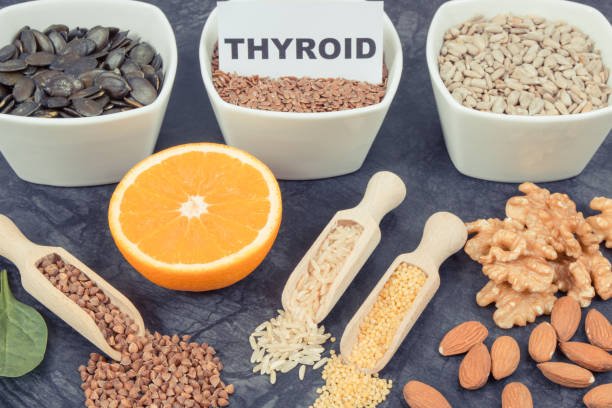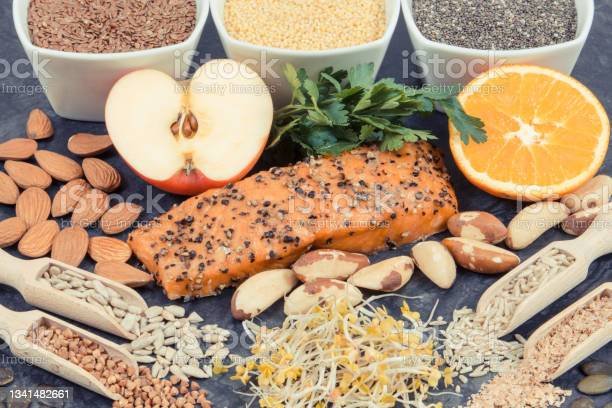Thyroid Nutrition Guide
Introduction

The thyroid gland plays a crucial role in regulating various bodily functions, from metabolism to hormone production. As an essential component of the endocrine system, the thyroid requires specific nutrients to maintain optimal health and functionality. This article aims to explore the relationship between nutrition and thyroid health, highlighting the importance of consuming the right foods to support the thyroid gland's well-being.
Understanding the Thyroid Gland
The thyroid gland, located at the base of the neck, is responsible for producing essential hormones that regulate metabolism, energy levels, temperature, and other bodily functions. The two primary hormones produced by the thyroid are thyroxine (T4) and triiodothyronine (T3). These hormones are derived from dietary iodine and tyrosine, making proper nutrition crucial for their synthesis.
The Impact of Iodine on Thyroid Function
Iodine is an essential mineral that directly affects thyroid health. It is a key component in the production of thyroid hormones. Without sufficient iodine intake, the thyroid cannot synthesize T4 and T3, leading to potential health issues such as hypothyroidism or goiter. Common sources of iodine-rich foods include iodized salt, seaweed, fish, and dairy products.
Selenium: An Important Antioxidant for Thyroid Health
Selenium, a trace mineral, acts as a powerful antioxidant, protecting the thyroid gland from oxidative stress. Additionally, selenium plays a critical role in the conversion of T4 to the active form, T3. Including selenium-rich foods like Brazil nuts, sardines, and eggs in the diet can help support proper thyroid function.
Zinc and Its Influence on Thyroid Hormones
Zinc is another essential mineral that contributes to thyroid health. It aids in the conversion of T4 to T3, supporting the body's metabolic processes. Zinc deficiency has been linked to decreased thyroid hormone levels, underscoring the importance of including zinc-rich foods like oysters, pumpkin seeds, and beef in the diet.
The Role of Iron in Thyroid Functionality
Iron is essential for the synthesis of thyroid hormones and their subsequent release into the bloodstream. An inadequate iron intake may lead to decreased thyroid hormone levels and impair thyroid function. Incorporating iron-rich foods like spinach, lentils, and tofu can help maintain sufficient iron levels to support the thyroid gland.
Omega-3 Fatty Acids and Thyroid Health
Omega-3 fatty acids are known for their anti-inflammatory properties and have been associated with improved thyroid function. These healthy fats are found in abundance in fatty fish, flaxseeds, chia seeds, and walnuts. Including omega-3-rich foods in the diet may help reduce inflammation in the thyroid gland and promote overall thyroid health.

The Impact of Antioxidants on Thyroid Health
Antioxidant-rich foods, such as colorful fruits and vegetables, play a crucial role in protecting the thyroid gland from oxidative damage. Free radicals can negatively impact thyroid function, leading to various health concerns. Consuming a diet rich in antioxidants helps neutralize free radicals and supports thyroid health.
Goitrogens: Understanding Their Role
While certain nutrients support thyroid health, some foods contain goitrogens, compounds that can interfere with thyroid function. Cruciferous vegetables like broccoli, cauliflower, and cabbage contain goitrogens, but their impact on thyroid function is limited when consumed in moderate amounts. Cooking these vegetables can also reduce their goitrogenic potential.
The Role of Dietary Fiber in Thyroid Health
A diet rich in dietary fiber is beneficial for overall health and may indirectly support thyroid function. By promoting healthy digestion and efficient elimination of waste products, dietary fiber helps maintain a balanced hormonal environment in the body, including thyroid hormones.
Water and Hydration for Thyroid Function
Adequate hydration is essential for overall health and can indirectly support thyroid function. Staying properly hydrated ensures optimal circulation of thyroid hormones throughout the body and aids in their transport to target tissues.
Conclusion
In conclusion, the thyroid gland plays a critical role in maintaining various bodily functions, and proper nutrition is key to supporting its health and functionality. Essential nutrients like iodine, selenium, zinc, iron, omega-3 fatty acids, and antioxidants all contribute to a well-functioning thyroid. While goitrogenic foods should be consumed in moderation, a balanced diet consisting of whole foods, rich in fruits, vegetables, lean proteins, and healthy fats, can greatly contribute to overall thyroid health. As with any health concern, it is advisable to consult with a healthcare professional for personalized dietary recommendations to support thyroid function.